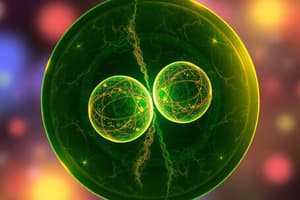Podcast
Questions and Answers
What occurs during prophase of mitosis?
What occurs during prophase of mitosis?
- Nuclear envelopes form around chromosomes.
- Chromosomes condense and the spindle forms. (correct)
- Homologous chromosomes separate to opposite poles.
- Chromosomes line up along the equator of the cell.
Which phase marks the alignment of paired homologous chromosomes along the equator?
Which phase marks the alignment of paired homologous chromosomes along the equator?
- Telophase II
- Metaphase II
- Metaphase I (correct)
- Anaphase I
What is the role of cytokinesis in cell division?
What is the role of cytokinesis in cell division?
- To separate the cytoplasm into two daughter cells. (correct)
- To align chromosomes along the equator.
- To condense chromosomes for replication.
- To reform the nuclear envelope.
In meiosis, what significant event occurs during prophase I that does not happen in mitosis?
In meiosis, what significant event occurs during prophase I that does not happen in mitosis?
During which stage of mitosis do the chromosomes separate and move to opposite sides of the cell?
During which stage of mitosis do the chromosomes separate and move to opposite sides of the cell?
What main event occurs during telophase of mitosis?
What main event occurs during telophase of mitosis?
How does cytokinesis differ in animal and plant cells?
How does cytokinesis differ in animal and plant cells?
What is the primary outcome of meiosis in terms of chromosome number?
What is the primary outcome of meiosis in terms of chromosome number?
Flashcards
Mitosis
Mitosis
Cell division that produces two identical daughter cells.
Interphase
Interphase
Cell growth and preparation for division.
Prophase
Prophase
Chromosomes condense, spindle forms, nuclear envelope breaks down.
Metaphase
Metaphase
Signup and view all the flashcards
Anaphase
Anaphase
Signup and view all the flashcards
Meiosis
Meiosis
Signup and view all the flashcards
Prophase I (Meiosis)
Prophase I (Meiosis)
Signup and view all the flashcards
Cytokinesis
Cytokinesis
Signup and view all the flashcards
Study Notes
Mitosis
- Mitosis is a type of cell division that produces two identical daughter cells
- It's crucial for growth, development, and tissue repair in eukaryotic cells
- Mitosis involves dividing a eukaryotic cell's chromosomes into two identical sets
Stages of Mitosis
- Interphase: The cell grows and prepares for division, including DNA replication
- Prophase: Chromosomes condense, the nuclear envelope breaks down, and spindle fibers form attaching to chromosomes.
- Metaphase: Chromosomes line up in the middle of the cell, along the equator
- Anaphase: Sister chromatids separate and move to opposite poles of the cell
- Telophase: The nuclear envelope reforms around each set of chromosomes, which may decondense.
- Cytokinesis: The cytoplasm divides creating two separate cells
Meiosis
- Meiosis is a type of cell division that reduces the number of chromosomes in gametes (sex cells like egg and sperm)
- It occurs in sexually reproducing organisms
Stages of Meiosis I
- Prophase I: Chromosomes condense and become visible, crossing over occurs (exchange of genetic material), spindle forms, and nuclear envelope breaks down
- Metaphase I: Paired homologous chromosomes line up along the equator of the cell
- Anaphase I: Homologous chromosomes separate and move to opposite poles of the cell
- Telophase I: Nuclear envelopes form around each set of chromosomes and the chromosomes may decondense; Cytokinesis usually follows, producing two cells
Stages of Meiosis II
Prophase II, Metaphase II, Anaphase II, Telophase II, with Cytokinesis following
- Prophase II: Spindle forms, Nuclear envelope breaks down
- Metaphase II: Chromosomes line up along the equator of the cell
- Anaphase II: Sister chromatids separate and move to opposite poles of the cell
- Telophase II: Nuclear envelopes assemble around each set of chromosomes; chromosomes decondense; Spindle disappears and Cytokinesis divides the cells, resulting four genetically unique haploid cells.
Studying That Suits You
Use AI to generate personalized quizzes and flashcards to suit your learning preferences.




